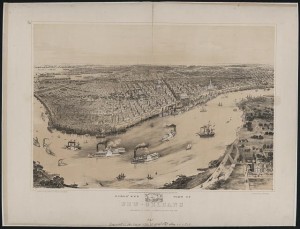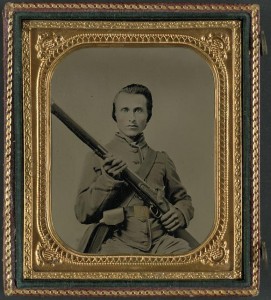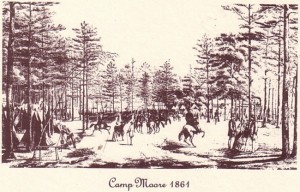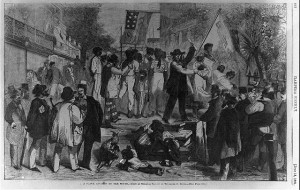On May 31, 1861 The New-York Times reported on the observations of RICHARD FAIRCHILD, a British subject who had lived for several years in St. Mary’s Parish, Louisiana. Because he was British Louisiana authorities allowed him to leave the Bayou State for New York City:
IMPORTANT FROM LOUISIANA.; Condition of Affairs in the State The Military Excitement Morale of the Troops Bad Commissariat Fears of Slave Insurrection Matters Along the Mississippi, &c.
… Mr. FAIRCHILD states that throughout Louisiana an intense excitement existed among the people. The news of the united sentiment of the North, and the extensive preparations making to maintain the power of the Government, had intensified the hostility of public feeling against the Government, and the determination was expressed to submit to the United States only when they were killed. The soldiery and masses of the people expressed confidence in their success, and the stupid bragadocio of the South, that “one Southerner was a match for five Yankees,” was often repeated and used to stimulate others to enroll themselves in the rebel ranks. The leaders who control the movements did not fully share in this confidence when conversing with one another, and some even admitted the possibility of the Government accomplishing its purposes, but contending they could only do so by effecting the annihilation of the Southern people.
Previous to his departure, Mr. FAIRCHILD visited the rebel camp on the Metaire Race Course, near New-Orleans. Eight thousand troops were there quartered, of whom he thought five thousand were well armed and fairly equipped. The remainder were indifferently supplied with arms and equipments. Much disturbance and dissatisfaction existed among them, owing to the inferior food supplied them, and the limited quantities and irregular manner in which it was dealt out. The want of proper clothing and blankets was also a great source of complaint. The camp is situated in the midst of a swamp, from which they were supplied with water. The means were not forthcoming, and did not exist, to properly equip and supply a large force; what means was obtained came reluctantly, and of course it could not be expected that the soldiers could get their pay.
Their rations consisted only of pork, beans, bread and coffee, and these often of the most inferior quality. Mr. F. was informed by the soldiers that they had several times been three or four days at a time without any beverage but swamp-water.
As a class the soldiers are inefficient, except those from New-Orleans, they being largely composed of mechanics and working-men.
Many companies of these are well drilled, and present a very soldier-like appearance. But the troops from the parishes present a sad spectacle. They are mostly planter’s sons, unused to toil of any kind, reared in indolence, often dissipated and physically weak. An ordinary Northern militia muster in the country in times of peace, would furnish better material for immediate service than the mass of the rebel troops that have come from the Louisiana parishes. In many instances the soldiers brought negro servants with them, but greatly to their “young masters'” grief, they were sent back — the Commissariat bring too low to admit of the luxury of privates in the ranks being furnished with servants. …
The women of Louisiana share in the prevalent feeling. Even before sunrise Mr. F. had seen them industriously at work, and continuing their exertions until dark, in making clothing for the troops. …
Well, I have heard that about two-thirds of all Civil War casualties were caused By non-battle-related disease.
THE METAIRIE RACE TRACK became the Metairie Cemetery in 1872.
Camp Moore was built near the Mississippi border and seems to have been a healthier environment: “The location of the camp was chosen due to its relatively high ground elevation, abundance of fresh drinking water, and being adjacent to the then New Orleans, Jackson & Great Northern Railroad line.”
___________________
The rest of the article is quite interesting and included topics like a group of about 1500 blacks who are organizing to defend Louisiana:
A novel feature in the military movements of the State was a body of 1500 free negroes, who were armed, and were daily drilling in New-Orleans. Mr. FAIRCHILD witnessed one of their parades. He states that they exhibit a fair proficiency in their evolutions. The non-commissioned officers were selected from the negroes themselves, but they were commanded by whites. The whole body had enlisted for general service, and were subject to be ordered to any point, at the option of the authorities.
Also, slave owners are afraid of slave insurrections because their slaves had heard that the federal government is going to free them.




